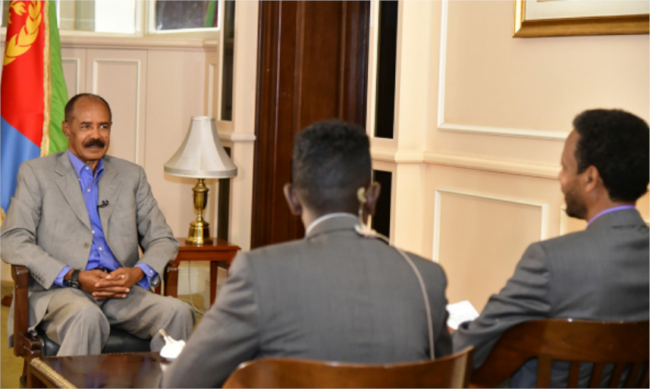The Effect of the Eritrean Butterfly
By Fathi Osman

Members of the inner circle of President Isaias Afwerki appreciate him as a voracious reader. Indeed, he is. He used this sort of ‘rare’ talent during the taut armed struggle years to build up his prestige and power base in the organization and later in the state. Because of this ‘unique’ intellectual capability, he has been pictured as a matchless seer.
Surrounded by a myriad of illiterate or poorly educated comrades, he has effectively developed an aura of an omniscient leader. Furthermore, the occupation with the day-to-day thick needs of the armed struggle made even the few well-educated fighters dull in relation to books and reading. Unlike his comrades, for example, he learned Arabic by reading classic texts and chatting with his Arabic-speaking friends in a flawless accent. The result is an impressing command of Arabic, envied by his impotent unilingual comrades.
Eritrean embassies in Washington, London, and in other capitals feed his passion with the latest books ‘fresh from publishing houses.’ However, this overvalued talent isn’t immune from deep-seated defects: A mischievous truth distortion skill; plus, an air of arrogance that portrays his followers as ignorant weaklings; in addition to a fine thread of plagiarism.
The Tigrinya proverb that goes, “a butterfly while- wackily- thinking that its wings cover the world; her back remains naked,” generates a similar sensation reflected by his interviews.
Afwerki’s January. 5, the interview was a type of such interview that babble about every world event except the events of real interest to Eritreans. This three-hour interview (his bottom record is 60 minutes) was a chance to display knowledge of world affairs through his favorite topic: state relations under unipolar world order analysis. Ethiopia under the ‘evil’ rule of the Tigray Peoples Liberation Front took the lion’s share of his analysis.
The journalists who interview him know his avid appetite for lengthy storytelling, therefore they don’t ask him precise questions. Opening with the topic of the hour: Ethiopia, the interview starts with: “In this regard, what can you tell us about the new developments in Ethiopia and what would be their influence or impact at the regional level? No wonder he kept ‘telling’ about these developments for more than one hour.
Because he is interested in uncovering global anti-national designs, he started his chatter by saying: “It important to keep in mind the bigger picture when analyzing events.”
In a stark contradiction to what has been the official narrative in Eritrea about Tigray leadership being the real cause that brought the country to a complete halt, he said: “… we realized that they-Tigray leaders-wanted to keep us hostage. We preferred to focus on other overarching matters (for the English translation of the interview see the Eritrean Ministry of Information website: www.shabait.com)
This runs counter the mantra the Eritrean people used to hear in the past twenty years.
Darker manipulation cloaks his account about his decision to intervene in the Ethiopian civil war. Declaring that the ultimate purpose of the war was to attack Eritrea, he said that Eritrean army intervention was a result of the missile attack against Asmara. In contrast to this incorrect and tardy disclosure, Isias Afwerki paid a visit at the peak of Covid-19 travel bans- to his ally Abiy Ahmed one month before the war’s breakout to finalize plans against the archrival Tigray People Liberation Front (TPLF).
He has, likewise, linked the intervention to the right of self-defense, the facts run against this distorted narrative, too. Sending troops as far as the Amhara region is no doubt a loose interpretation of the principle of self-defense.
In his mind-numbing interviews, scathingly criticizing American hegemony, Afwerki is dishonest in availing his sources. Falling under the spell of one of his interviews, in which he severely criticized the unipolar American world order, an Eritrean diplomat asked me once if I had seen the president interview disclosing American power designs. In turn, I asked him if he had read Zbigniew Brzezinski’s book: Strategic Vision: America and the Crisis of Global Power (assuming a senior diplomat wouldn’t miss the book.) He apologized that he never heard the author’s name, (a famous Harvard University professor and Jimmy Carter’s National Security Advisor). I said the great ‘analyst-president’ used almost every sentence in that book to advance his criticism, without being honest enough to tell his audience about the reference for, at least, the sake of additional information.
Finally, what makes Afwerki’s interviews more offensive to Eritreans is the fact that he keeps criticizing his own performance by using the famous and repeated phrasing: “We haven’t achieved anything.” Then he proceeds to cite the sectors where ‘we’ have failed: Education, infrastructure, fisheries, so on and so forth.
Attributing failure to whatever group other than himself isn’t only malicious, but it also oozes out contempt. When all the decisions of state affairs from sending troops to the capital of a neighboring country to installing a lamppost are taken only by ‘him’, saying that we failed is a merely a pathetic ruse of putting blame on others, which became a salient feature not only of his interviews but of his own character.
Short URL: https://english.farajat.net/?p=11457















